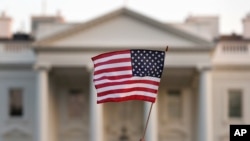President Donald Trump's latest curb on immigration tightens and extends restrictions on foreign work visas and legal immigration to the U.S.
The newly-signed order blocks — through the end of the year — visas for a variety of guest workers such as au pairs, engineers and scientists, who come to work for a limited period of time in America.
Who is affected?
The order covers H-1B visas for high-skilled workers widely employed by America's tech industry, L visas often used by businesses to transfer foreign workers within a company, J-1 visas for foreign cultural and work exchanges, and H-2B visas for temporary workers in nonagricultural industries.
Visa holders' dependents, such as spouses and minor children, would be affected as well. They usually receive visas with limited work possibilities.
Who is not affected?
The order does not cover those who already have valid visas or green cards — whether inside or outside the country — or those who already applied for green cards or temporary visas from inside the U.S.
Others exempted under the order include spouses or children of U.S. citizens, those providing services deemed essential for the U.S. food supply, or if someone is of national interest as determined by the State Department or the Department of Homeland Security.
What is the administration's rationale for the order?
Trump said the order aims to protect American jobs at a time of high unemployment during the COVID-19 pandemic.
The order came two months after the president announced an initial suspension of green cards, which provide permanent legal residency, arguing steps were needed to promote America's economic recovery.
Who welcomed the announcement?
While reaction has been mostly negative on Capitol Hill, Republican Sen. Ted Cruz of Texas called the order "important" and said in a statement: "We must focus on preserving American lives and American jobs. That's why I called on POTUS to continue halting legal immigration during these dual crises."
NumbersUSA, a group advocating restrictive immigration policies, called the decision "unprecedented" and said it "applauded" the president's decision to temporarily halt the entry of certain immigrants and guest workers.
"For the more than 45 million Americans who have lost their jobs during this pandemic, this EO represents real opportunity to regain employment at a livable wage. Just as important, it represents an opportunity for American employers to broaden their recruitment efforts into historically underserved communities and prove that Americans will do those jobs," NumbersUSA said in a statement.
Who opposes the order?
The immigration order has sparked bipartisan opposition in both houses of Congress. South Carolina Republican Sen. Lindsey Graham, usually a staunch defender of Trump, tweeted, "Legal immigration is a positive for the American economy" and that the order "will have a chilling effect on our economic recovery."
In a statement with a colleague, House Judiciary Committee Chairman Jerrold Nadler, a New York Democrat, accused the president of attempting "to distract the American public from his abject failure to combat COVID-19."
A loud chorus of opposition has also emerged from immigrant rights organizations and other advocacy groups.
What is the business community saying?
The head of the U.S. Chamber of Commerce, Tom Donohue, said restricting immigration will hold back the country economically.
"Restrictive changes to our nation's immigration system will push investment and economic activity abroad, slow growth, and reduce job creation," Donohue said.
Tech industry companies also spoke in strong opposition.
"This proclamation undermines America's greatest economic asset: its diversity. People from all over the world come here to join our labor force, pay taxes, and contribute to our global competitiveness on the world stage," a Twitter spokesperson said.
Google CEO Sundar Pichai said immigration benefits Google, but also America's economy more broadly.
"Immigration has contributed immensely to America's economic success, making it a global leader in tech, and also Google the company it is today," Pichai wrote, adding he was "disappointed" by the proclamation but, "we'll continue to stand with immigrants and work to expand opportunity for all."
What are the analyses from researchers and legal experts on the order's outcome?
Alex Nowrasteh, Cato Institute's director of immigration studies, said reducing immigration under the current health crisis will "exacerbate" COVID-19's economic destruction and delay the eventual recovery.
"During the pandemic, H-1B workers and other skilled migrants working in IT have made it possible for many million Americans to keep their jobs by working remotely. Shutting off this flow of skilled workers into the United States just when we need them the most will only harm hardworking people just trying to scrape by in the shadow of this devastating pandemic," Nowrasteh wrote.
The analyst argued that if the Trump administration wants to create a merit-based immigration system that prioritizes educated immigrants with skills, an H-1B visa program suspension does not advance "merit-based immigration."
As a result of the new restrictions, the Migration Policy Institute (MPI) estimated that about 167,000 temporary workers will be kept out of the United States.
Rosanna Berardi, an immigration lawyer from Buffalo, New York, who has a lot of her clients under the H-1B visa category, said though there is a "wide range" of exceptions, especially with health care workers, the proclamation does not deliver exactly what it promises.
"The average American may think President Trump is saving jobs for Americans, but it doesn't really add up. ... If you're outside of any of those categories you can still come to the United States. And so that's a whole lot of people. The immigration categories go from the letter A, all the way to the letter U. This is just three of those out of 20-something categories," she added.





